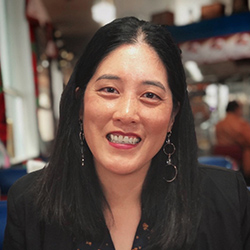Language—died, brilliant and beautiful
on August 1, 2009 at 2:46 p.m. Lover
of raising his hand, language lived
a full life of questioning. His favorite
was twisting what others said. His
favorite was to write the world in black
and white and then watch people try
and read the words in color. Letters
used to skim my father’s brain before
they let go. Now his words are blind.
Are pleated. Are the dispatcher, the
dispatches, and the receiver. When
my mother was dying, I made everyone
stand around the bed for what would
be the last group photo. Some of us
even smiled. Because dying lasts
forever until it stops. Someone said,
Take a few. Someone said, Say
cheese. Someone said, Thank you.
Language fails us. In the way that
breaking an arm means an arm’s bone
can break but the arm itself can’t break
off unless sawed or cut. My mother
couldn’t speak but her eyes were the
only ones that were wide open.
Notes on the Poem
Over the next few months, our Poem of the Week will feature works from the seven collections of the newly announced 2021 Griffin Poetry Prize shortlist. This week’s poem is from Victoria Chang’s deeply haunting collection, Obit—a series of surreal obituaries extending the definition of what can and can’t be mourned. Chang teaches us how to speak grief, a language in which the unsayable and the mundane coexis—a ghostly, yet deeply material syntax. Of Obit, the 2021 Griffin Poetry Prize judges say: “...Death is not something that happens to someone else—it is yours too, up close and personal, and deeply particular. It is not just a name or person or relation that dies—it is a frontal lobe, language inside the phone, the voicemail, the view and experience, the language they made or didn’t make, their sounds too...Every bit of a lived life gets a spot. In this book ‘grief takes many / forms, as tears or pinwheels...’‘dying lasts forever / until it stops’ and ‘our sadness is plural, but grief is / singular.” In this Rumpus interview, Chang discusses Obit Listen to her read from Obit Here
